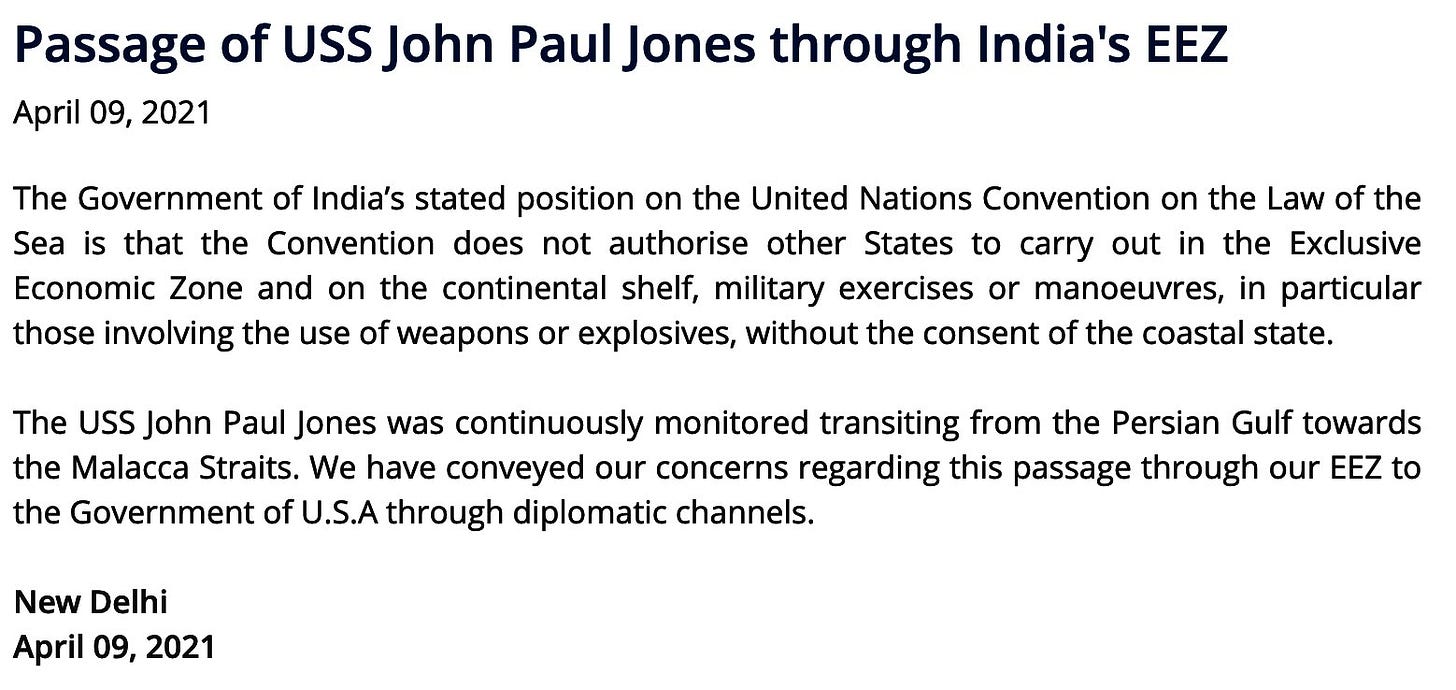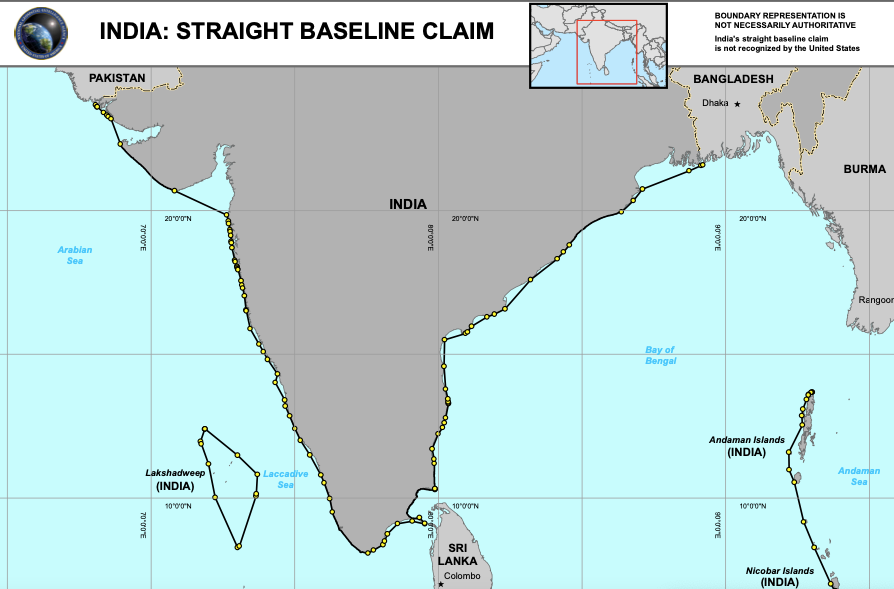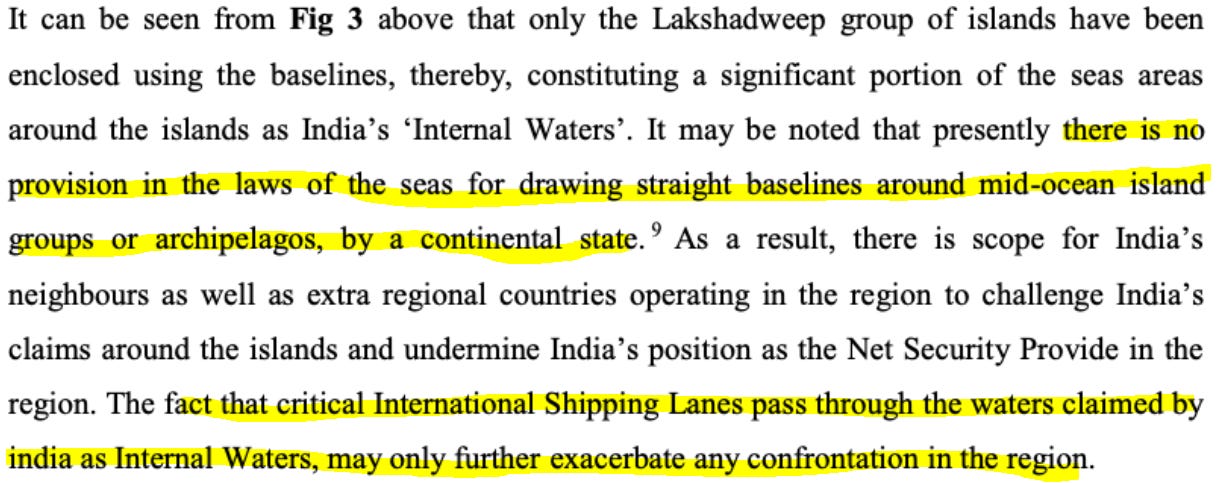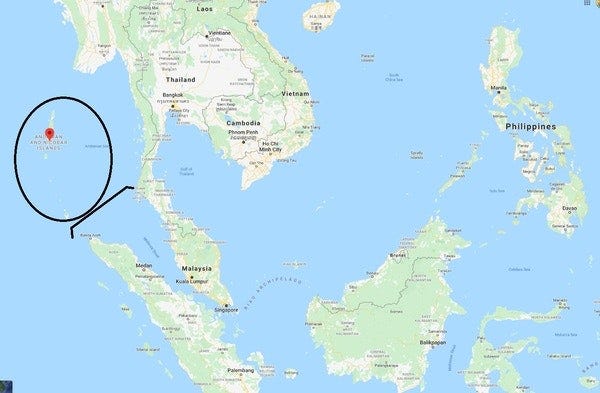Insightful newsletter of Drishtikone: Issue #283 - The FONOP faux pas
Yes, we understand that FONOP action from US was not new. Also the announcement was not just for India. But for an administration looking to lead this was a snub.
Image by Leonardo Paniagua from Pixabay
“Most people, when they are set upon looking into other people's affairs, never turn to examine themselves.” ― Xenophon, Conversations of Socrates
Once there was a king in Magadh named Indradyumna. His queen was Ahalya. There was a young handsome man of loose morals in the palace named Indra. The queen fell in love with the young man and went crazy. She would have her maids bring him to her and they would meet in a secret place and enjoy. When the king came to know he punished and tortured them. But Indra laughed. The loose man had become a lover. He said to the king
O king, the entire universe to me is nothing but my beloved. So it is to Ahalya. Hence we are unaffected by all these. Sir, I am only mind; and mind alone is the individual. You can punish the body, but you cannot punish the mind nor bring about the least change in it. If the mind is fully saturated with something, whatever happens to the body does not affect the mind. The mind is unaffected even by boons and curses, even as the firmly established mountain is not moved by the horns of a little beast… The body does not create the mind, but the mind creates the body. The mind alone is the seed for the body: when the tree dies, the seed does not, but when the seed perishes, the tree dies with it. If the body perishes, the mind can create other bodies for itself.” (Vasistha’s Yoga: The Story of Ahalya)
If you need a method of personal transformation, this is it.
UNCLOS and FONOP faux pas
On April 7th, the US Navy made a statement that was not aligned to the practice hitherto. It shared how its 9,000-tonne guided-missile destroyer USS John Paul Jones from its 7th Fleet had “asserted navigational rights and freedoms approximately 130 nautical miles west of Lakshadweep Islands, inside India’s exclusive economic zone, without requesting India’s prior consent, consistent with international law”. In fact, it went ahead further to assert that “India requires prior consent for military exercises or maneuvers in its exclusive economic zone or continental shelf, a claim inconsistent with international law.”
Basically, the US cited the Freedom of Navigation Operations (FONOP). India's response was along the lines of its stand that the US needed prior permission, a requirement that had been hitherto not insisted upon in the case of the US.
The US Navy has carried out FONOPS earlier in the Indian waters as well. But this was the first time that it had announced it.
“More than the FONOP, what possibly irked New Delhi more was the publicity the US Navy gave it,” said Sameer Patil, a fellow in the international security studies programme at Gateway House, a Mumbai-based think tank, pointing to Washington’s move to announce the operation in a press release. “Previously, they’ve carried out such operations [in New Delhi’s EEZ] against Indian claims but they have never announced it.” (Source)
The US has routinely challenged the maritime claims of at least 19 governments (which included Brazil, Japan, Malaysia, South Korea, Taiwan, Vietnam and mainland China) between October 2019 and September 2020. But now it has made a practice of rubbing it in. ostensibly using “boilerplate” announcements.

Though this practice by the US is not that straightforward. It picks and chooses whom “to discipline”.
Rachel Esplin Odell, a research fellow in the East Asia programme at the Quincy Institute think in Washington, wrote on Twitter that while the US’ statement was true, “it still picks and chooses” against whom it conducts FONOPs, and that it had not conducted formal operations against Australia or Canada “despite objecting to their ‘excessive’ claims”. (Source)
In February, the US chose to go for asserting FONOP in the South China Sea.
On Feb. 17, the USS Russell (DDG 59) conducted a freedom of navigation operation (FONOP) near the Spratly Islands (Malay: Kepulauan Spratly; Mandarin: Nánshā Qúndǎo; Tagalog: Kapuluan ng Kalayaan; Vietnamese: Quần đảo Trường Sa) in the South China Sea. It was the second FONOP in the South China Sea under the Biden administration. A U.S. Seventh Fleet press release said the transit challenged unlawful restrictions on innocent passage imposed by China, Vietnam and Taiwan. The statement noted that all three states insist on permission or advance notice before a foreign military vessel transits through their territorial seas, violating the right of no-notice innocent passage under UNCLOS. (Source)
What is strange is that the leaders of the Quadrilateral Security Dialogue (Quad) had met on March 12 and had cited the United Nations Convention on the Law of the Sea (UNCLOS) then as well but “to meet challenges to the rules-based maritime order in the East and South China Seas.”
What is UNCLOS?
The laws at the heart of this controversy are from the UN Convention on the Law of the Sea (UNCLOS), 1982 (Source). It is considered to be “the constitution of the oceans.” It was finalized in 1982 and comprises 320 articles and 9 annexes. 157 nations have signed up on it.
Except for one nation - the United States of America. (Source)
That is what the US government is challenging in a public manner. The Hindu newspaper’s China correspondent claims that India’s claims are inconsistent with the UNCLOS.
India's Straight Baseline claims, as Manoj Joshi points out, are inconsistent with UNCLOS and only for archipelagic states. Similar claims made by China in the South China Sea have also been challenged by the US. (Source)
The Straight Baseline Claim with respect to the islands around Lakshadweep and Andaman are being said to be inconsistent with UNCLOS.
What are Straight baselines and Archipelagic baselines?
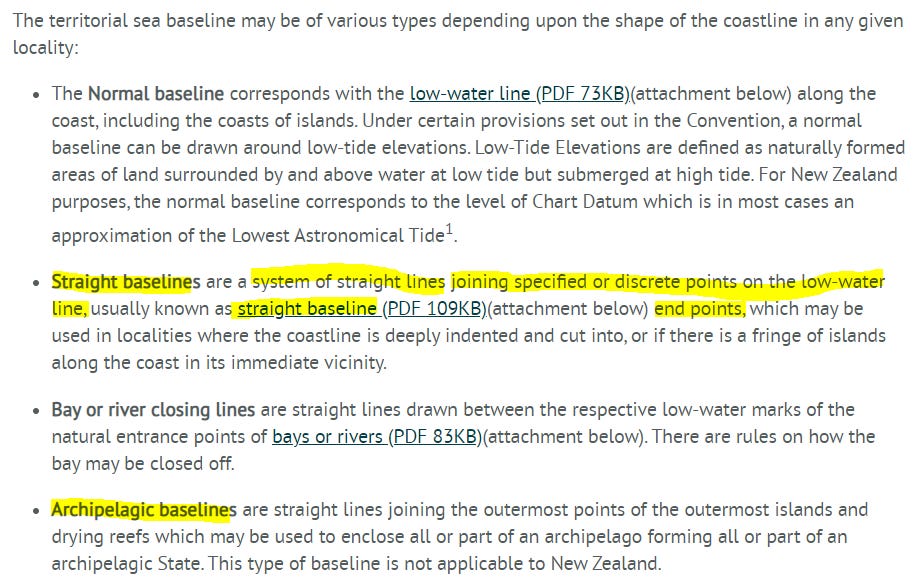
Captain Abhishek Kumar in his Master's thesis under Rear Admiral Sudarshan Shrikhande at the Naval War College has also shared earlier that Indian claims are inconsistent with UNCLOS. (Source)
Why is this such a big deal for India?
The main issue at the heart of this whole controversy is India’s geographical advantage over some of the most contentious International Shipping Lanes (ISLs). India’s Andamans sit at the mouth of one of the most critical global trade choking points. Please read Issue #266 - QUAD and the Future of Global Trade! for a better appreciation of what leverage India has against China.
Malacca Straits is an important leverage that India would be foolish to lose.
It is the passage for 70,000 ships a year and 15.2 million barrels of oil a day. (Source)
But there are enough experts - mostly in the US think-tanks who are downplaying this whole thing.




The problem with this analysis is that it looks at it from the perspective of “who was right?” That is quite simplistic. Their argument is two-fold:
FONOP was nothing new from the US perspective. Its been going on.
US announcement was ‘boilerplate’ release which was common for all other countries as well
It’s business as usual - move on, buddy!
That may have worked with someone like Dr. Manmohan Singh at the helm. Not so for Modi. Modi’s team has shown a strong urge to lead the neighborhood, if not the world in defense and security issues. He is proactive. COVID diplomacy showed that abundantly. Batsmen hit sixes off of every bowler, but when you hit a straight six off of the fastest bowler of the opposite side, he usually takes that as a disgrace. After that, you are a target.
Modi’s team is in it not for the “status quo”. It is there to lead. That is what QUAD is for.
For the US to treat India’s security concerns - which arise more from the Chinese end and they will get convoluted post this event - as boilerplate release issue is rather too simplistic.
In any case, QUAD had to almost conspire to bring Biden in line with the Free and Open Indo-Pacific (FOIP) strategy after he was pushed by China to the other side. This diplomatic change in the US stance will mean recalibration from other members of QUAD.
Please listen to this excellent conversation that PGgurus Sri Iyer has with Abhijit Iyer-Mitra on this topic. As quirky as Abhijit is, he does bring a lot of useful insights into geopolitics. Compared to his work, what we get from mainstream and the regular leftist online rags is - to put it politely - trash.
It is important to understand why the dispute is there in the first place.
Ambiguous UNCLOS clause and US hypocrisy
The dispute has arisen because the language in Article 58 of the UNCLOS that deals with EEZ is confusing and ambiguous. While India ratified the UNCLOS in June 1995, the US is obviously not a signatory.
Harvard International Review discusses the American hypocrisy relative to UNCLOS thus:
Both of these issues share a similar quality: the United States justifies its own actions and seeks to oppose those of Russia in the Arctic and China in the South China Sea on the grounds of international law. On the former issue, UNCLOS explicitly lays out the process and limitations of continental shelf territorial claims and resource extraction. On the latter, it lays out explicitly the process for claiming territory along the basis of islands and historical precedent. However, the United States cannot claim Russia and China to be in violation of a treaty that it is not a party to. When UNCLOS was initially signed in 1982, the Reagan administration refused to accede based on disagreements regarding deep seabed mining. Despite revisions to the treaty in 1994, the Senate refused to hold hearings on the matter. Although Senator Richard Lugar of Indiana finally held hearings in 2004 and the Senate Foreign Relations Committee unanimously recommended adopting the treaty, no further action was taken by the Senate. (Source)
It is the exact same stance that the US has taken in this case.
“We don’t agree to UNCLOS, but we will use it on you.”
The only reason why no one turns around to throw a similar response back at the US is because of its might.
And, it is this might which it probably wanted to assert, as M.K. Bhadrakumar points out.
The bottom line is that in the Indian Ocean Region (IOR), India should not punch above its weight. It may not be a coincidence that Washington administered this firm stricture within earshot of Prime Minister Narendra Modi’s highly-publicised High Level Virtual Event on Thursday with Wavel Ramkalawan, Prime Minister of Seychelles, for “the joint e-inauguration of several development assistance projects funded by India in Seychelles and the handing over of a Fast Patrol Vessel supplied by India for the use of the Seychelles Coast Guard.” (Source)
There not only has been a talk of “establishment of a top-secret military asset by India in Seychelles’s Assumption Island,” but also “Modi Government’s reported plans of setting up a military base” in Seychelles.
This, Bhadrakumar thinks, could have irked the US Navy. Which believes it is big enough to own everything in the seas.
market corner: 10 quick bytes
Sporadic lockdowns to cost India $1.25 billion per week: Barclays - more
As much as ~13,300 km of National Highways were built in FY21 compared with around 10,240 km in FY20, up around 30% y-o-y - more
Alibaba shares jump 8% as China ends its antitrust probe on Jack Ma's tech empire with a record $2.8 billion fine - more
WeWork India raises Rs 200 cr from investors to grow biz, become profitable in 2021 - more
Govt to tweak income tax law further to prevent pile-up of disputes - more
Why Hitachi Is Spending $9.6 Billion to Dive Into the Software Business - more
Google founders Larry Page and Sergey Brin are now worth more than $100 billion, making them 2 of only 8 centibillionaires in the world - more
‘2.1M women at the center of India’s direct selling market have become successful entrepreneurs’ - more
'Data of 1.3 million Clubhouse users leaked online' - more
Second wave impact: Nomura revises India's FY22 growth to 12.6% from 13.5% - more
nota bene
Hospitals filling up: From 10% on March 27, the occupancy rate in private hospitals of Ghaziabad has shot up to over 51% in just 15 days. The demand for ICU beds is higher. Currently, 61% of the 223 Covid ICU beds in the district are occupied. The figure was about 18% a fortnight ago. Neighbouring Gautam Budh Nagar has also seen a similar trend in the past 10 days. (Source)
HC Judges Retirement Age: There is something wrong in their thinking if lawyers do not want to become judges because of the retirement age, observed the Supreme Court on Monday while rejecting a plea on increasing the retirement age of high court judges from 62 to 65. A bench, headed by Chief Justice of India (CJI) SA Bobde, was amused when petitioner in the case, Ashwini Upadhyay, submitted that he knew “some very fine lawyers” who did not want to become judges in the high courts because the retirement age was 62. (Source)
Blank Check to Pakistan: When Russian Foreign Minister Sergey Lavrov visited Islamabad last week after a gap of nine years, he had delivered an "important" message to the Pakistani leadership. The message was from President Vladimir Putin. "I came with a message from my president that tells Pakistan we are open for any cooperation, whatever Pakistan needs Russia is ready for it," Lavrov was quoted by a senior Pakistani official, who attended the closed-door meeting between the Russian foreign minister and Pakistani authorities, as saying. "In other words, the Russian president offered us a blank cheque," said the official, who requested not to be named because of the sensitivity of the issue. (Source)
Sabotaging Iran’s Nuke Program: Iran's nuclear program has been targeted by diplomatic efforts and sabotage attacks over the last decade, with the latest incident striking its underground Natanz facility. The attack Sunday at Natanz comes as world powers try to negotiate a return by Iran and the U.S. to Tehran's atomic accord. The sabotage threatens to upend those negotiations and further heighten regional tensions across the Mideast. (Source)
Iran targeting Lebanon: "Iran backed APT34 shows no sign of slowing down, further pushing its political agenda in the middle-east, with an ongoing focus on Lebanon — using offensive cyber operations," the researchers said. "While maintaining its modus operandi and reusing old techniques, the group continues to create new and updated tools to minimize the possible detection of their tools by security vendors." (Source)
video corner: Kingdom of Women
The Mosuo tribe is very different. It is created with women as the lead. At night Mosuo adults are free to experience sexuality with as many or as few partners as they wish. Though a Mosuo woman is allowed to change partners whenever she likes, having only one sexual partner is not uncommon. Typically walking marriages are long-term.
“Men are obedient to the scheme of things” as one translator in this video puts it.
In remote China, an ethnic minority has built a matrilineal society dubbed the “Kingdom of Women,”
Today’s ONLINE PAPER: Check out today’s “The Drishtikone Daily” edition. - THE DRISHTIKONE DAILY
Nuzzle Tweets “newsletter” - with tweets and stories that we read and follow in a day in one compilation on a daily basis - Nuzzle Drishtikone - just another way to keep up with things
SUPPORT DRISHTIKONE: If you consider our work important and enriching and would like to contribute to our expenses, please click on the button below to go to the page to send in your contribution. You can select the currency (for example, INR or USD, etc) and the amount you would like to contribute. Contribute to Drishtikone
If you like this post - please share it with someone who will appreciate the information shared in this edition
If you like our newsletter, please share it with your friends and family





